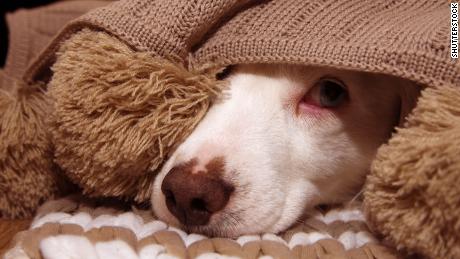(CNN)Fireworks may look beautiful and festive, but in many of our very sensitive ears. And it explodes like a magnified gunshot. Pets.
Needless to say, when scared, the dog is bolted and the owner can lose his best friend at night.
"Dog is known to dig under fences, jump over, break tethers, break windows, depending on the fear of fireworks," said the oldest in the United States. The Best Friends Animal Society, one of the murder bans, said.
As a result, dogs are free-ranged, hit by cars, picked up by strangers, and turned into local animal shelters. Pet owners who care can face barriers in identifying and rescuing their pets.
Dangers to all types of pets
"Many animals associate loud noises with danger," said Dr. Michelle Gones, a veterinarian at the Best Friends Animal Society. "From an evolutionary point of view, it's not surprising that fireworks are causing pain to many animals, as they are wired to avoid perceived threats."
It's not just dogs. Cats and many other livestock and wildlife have sensitive hearing provided by nature to find and hunt for prey.
"Cats are very likely to suffer from fireworks phobia as much as dogs," Lugones said. "But cats tend to be more self-reliant in the house and usually run and hide in horrific situations, so owners may not be aware that they are suffering from fireworks."


Prepare to protect your fellow animals prior to the fireworks celebration on July 4th.
Small pets such as rabbits and guinea pigs are prey seeds, so stress tends to build up, Lugones continues. He has an underlying illness. He can also get injured trying to escape.
Because cows are social animals, loud noises can hit the entire herd, but horses are also a prey species that can easily be surprised by fireworks.
"It may not be well understood how reptiles and birds react to fireworks, but they also have a stress response, so precautions need to be taken," she said. Said.
Prepare your pet before it gets dark
The key to helping your pet survive this horrific onslaught is in place, American Veterinary Medicine said. Dr. Douglas Kratt, president of the association, said. ..
Tags and microchips. Make sure your pet has a proper collar with the current identification tag, Kratt said. If your pet has a microchip, make sure the correct contact information is recorded at the veterinary clinic or shelter where the chip is embedded.
That way, if your pet escapes in the middle of the night, you can immediately call and warn your vet or shelter about your absence.
Exercise before it gets dark.A tired dog is a calm dog. Kratt said that happy cats are more relaxed cats. Match some extra play time for your cat, and take your dog to play and exercise well before it gets dark. Such activities burn extra energy, thereby limiting anxiety when it comes time to sleep later.
Take all pets indoors. Do not leave your pet outside to suffer alone. According to Kratt, keep your dog's box or bed in the quietest and most closed room possible.
"Keep the windows and curtains closed to further mute the sound, turn down the lights, cover the crate with a blanket, and see what works best for your dog," he said. Said.
Cats like to climb high for safety, so give them a cozy covered cave that rises above the ground, like an indoor cat tree or closet hut.
Distract your pet's attention.We offer many new toys and long-lasting chews and treats. Food puzzles may also keep them distracted from anxious sounds.
. Use a calm sound.First, when you close the curtains and doors near your pet, you will hear a muffled sound. You can use subdued music or white noise (but not too loud) like a fan or TV to provide a comfortable and friendly sound.
Humans must also be calm.If you don't like fireworks, just calm around your pet, Kratt said.
"Our pets may look to us to see how we react and are influenced by our behavior," he said. Told. "Do not react strongly to fireworks or pet pain."
Use medicines as a last resort.It's okay to rely on a veterinarian to calm the drug, but experts say that pet owners may trust it first without giving the above behavior modification tips. I'm worried. But if you've tried all these ideas and your furry friend is still panicking, talk to your vet.
Keep animals away from fireworks.If your pet is not annoyed by noise and you plan to launch your own fireworks, keep your pet inside and keep it safe. Some dogs "chase bright moving objects and risk burns and blinding in the process," says Best Friends Animal Society.
Also, many fireworks contain "toxic substances when ingested", so keep the fireworks safe in a place where pets cannot be found.
When the fireworks are over
The danger of pets extends beyond the explosion of fireworks, Kratt said.
"The Force has other risks for pets, such as the abundance of unhealthy and readily available food at parties, the dangerous summer heat, and the dangerous debris of the ground after the fireworks display." Said Kratt.
The next day, carefully check for any leftovers or parts of the exploding fireworks before letting go of your pet in the yard.
"Even if you don't launch the fireworks yourself, the fireworks can invade your yard and curious animals can pick them up and play or eat them," says Kratt. ..
Used and unused fireworks are toxic to pets, Lugones said.
"Fireworks can cause severe gastrointestinal symptoms such as vomiting, bloody diarrhea, abdominal pain, and foreign body obstruction, depending on the chemicals they contain," she said. "It can also cause acute renal failure, dyspnea, and seizures. If you are concerned that your pet has ingested fireworks, contact your veterinarian immediately."


